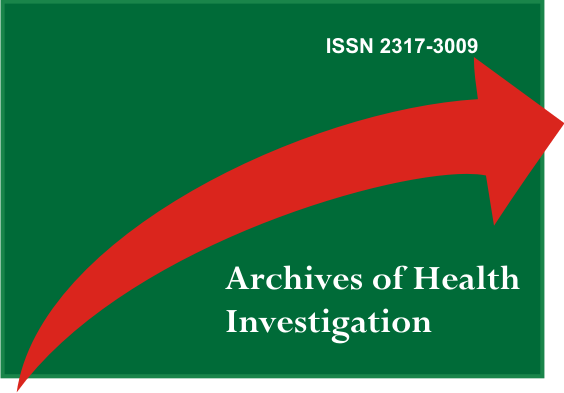Bráquetes autoligáveis – parte II
DOI:
https://doi.org/10.21270/archi.v5i2.1306Resumen
A evolução sistemática dos materiais ortodônticos impulsiona uma contínua inovação tecnológica com o objetivo de potencializar a biocompatibilidade dos tratamentos, tornando-os constantemente mais simples e eficientes. Mas, apesar de todo conteúdo publicado em revistas especializadas sobre os bráquetes autoligáveis (AL), o tema ainda é motivo de controversia, sobretudo mediante comparação da eficiência com os bráquetes convencionais (BC). Desse modo, o objetivo dessa revisão é fornecer embasamento científico para a utilização desses acessórios na rotina ortodôntica.Descritores: Movimentação Dentária; Desenho de Aparelho Ortodôntico; Fechamento de Espaço Ortodôntico.
Descargas
Citas
Harradine N. Self-ligating brackets increase treatment efficiency. Am J Orthod Dentofacial Orthop. 2013;143(1):10-8.
Fleming PS, O'Brien K. Self-ligating brackets do not increase treatment efficiency. Am J Orthod Dentofacial Orthop. 2013;143(1):11-9.
Miles PG. Self-ligating brackets in orthodontics: do they deliver what they claim? Aust Dent J. 2009;54(1):9-11.
Pandis N, Eliades T, Bourauel C. Comparative assessment of forces generated during simulated alignment with self-ligating and conventional brackets. Eur J Orthod. 2007;31(6):590–5.
Chen SS, Greenlee GM, Kim J, Smith CL, Huang GJ. Systematic review of self-ligating brackets. Am J Orthod Dentofacial Orthop. 2010;137(6):726.e1-726.e18.
Čelar A, Schedlberger M, Dörfler P, Bertl M. Systematic review on self-ligating vs. conventional brackets: initial pain, number of visits, treatment time. J Orofac Orthop. 2013; 74(1):40-51.
Faltermeier A, Burgers R, Rosentritt M. Bacterial adhesion of Streptococcus mutans to esthetic bracket materials. Am J Orthod Dentofacial Orthop. 2008;133(4 Suppl):S99-103.
Brusca MI, Chara O, Sterin-Borda L, Rosa AC. Influence of different orthodontic brackets on Adherence of microorganisms in vitro. Angle Orthod. 2007;77(2):331–6.
Sukontapatipark W, el-Agroudi MA, Selliseth NJ, Thunold K, Selvig KA. Bacterial colonization associated with fixed orthodontic appliances. A scanning electron microscopy study. Eur J Orthod. 2001;23(5):475-84.
Do Nascimento LE, Pithon MM, dos Santos RL, Freitas AO, Alviano DS, Nojima LI, Nojima MC, Ruellas AC. Colonization of Streptococcus mutans on esthetic brackets: Self-ligating vs conventional. Am J Orthod Dentofacial Orthop. 2013;143(4 Suppl):72-7.
Weltman B, Vig KW, Fields HW, Shanker S, Kaizar EE. Root resorption associated with orthodontic tooth movement: A systematic review. Am J Orthod Dentofacial Orthop. 2010;137(4):462-76.
Jacobs C, Gebhardt PF, Jacobs V, Hechtner M, Meila D, Wehrbein H. Root resorption, treatment time and extraction rate during orthodontic treatment with self-ligating and conventional brackets. Head Face Med. 2014;10:2. DOI: 10.1186/1746-160X-10-2.
Chen W, Haq AAA, Zhou Y. Root resorption of self-ligating and conventional preadjusted brackets in severe anterior crowding Class I patients: a longitudinal retrospective study. BMC Oral Health. 2015; 15:115. doi: 10.1186/s12903-015-0100-0.
Pandis N, Nasika M, Polychronopoulou A, Eliades T. External apical root resorption in patients treated with conventional and self-ligating brackets. Am J Orthod Dentofacial Orthop. 2008;134(5):646-51.
Heiser W. Time: a new orthodontic philosophy. J Clin Orthod. 1988;32(1):44-53.
Shivapuja PK, Berger JL. A comparative study of conventional ligation and self-ligation brackets systems. Am J Orthod and Dentofacial Othop. 1994;106(5):472-80.
Thorstenson GA, Kusy RP. Comparision of resistance to sliding between different self-ligating brackets with second-order angulation in the dry and saliva states. Am J Ortho and Dentofacial Orthop. 2002;121(5):472-82
Montasser MA, El-Bialy T, Keilig L, Reimann S, Jäger A, Bourauel C. Force levels in complex tooth alignment with conventional and self-ligating brackets. Am J Orthod Dentofacial Orthop. 2013;143(4):507-14.
Montasser MA, Keilig L, El-Bialy T, Reimann S, Jäger A, Bourauel C. Effect of archwire cross-section changes on force levels during complex tooth alignment with conventional and self-ligating brackets. Am J Orthod Dentofacial Orthop. 2015;147(4 Suppl):S101-8.
Ehsani S, Mandich MA, El-Bialy TH, Flores-Mir C. Frictional resistance in self-ligating orthodontic brackets and conventionally ligated brackets: a systematic review. Angle Orthod. 2009;79(3):592-601.
Budd S, Daskalogiannakis J, Tompson BD. A study of the frictional characteristics of four commercially available self-ligating bracket systems. Eur J Orthod. 2008;30(6):645-53.
Araújo CCM, Maltagliati L. A. Avaliação das inclinações dentárias obtidas no tratamento ortodôntico com bráquetes autoligados utilizando tomografia computadorizada. Ortodontia SPO. 2008;41:412.
Archambault A, Major TW, Carey JP, Heo G, Badawi H, Major PW. A comparison of torque expression between stainless steel, titanium molybdenum alloy, and copper nickel titanium wires in metallic self-ligating brackets. Angle Orthod. 2010;80(5):884-9.
Brauchli LM, Steineck M, Wichelhaus A. Active and passive self-ligating: a myth? Part 1: torque control. Angle Orthod. 2012;82(4):663-9.
Pandis N, Strigou S, Eliades T. Maxillary incisor torque with conventional and sel-ligating brackets: a prospective clinical trial. Orthod Craniofacial Res. 2006;9(4):193-8.
Gick MR, Nóbrega C, Benetti JJ, Jakob SR, Zucchi TU, Arsati F. Comparative study of the movement of torque induced by systems self-ligation and conventional. Orthod Sci Practice 2012;5(17):37-46.
Morina E, Eliade T, Pandis N, Jager A, Bourauel C. Torque expression of self-ligating brackets compared with conventional metallic, ceramic and plastic brackets. Eur J Orthod. 2008;30(3):233-8.
Songra G, Clover M, Atack NE, Ewings P, Sherriff M, Sandy JR, et al. Comparative assessment of alignment efficiency and space closure of active and passive self-ligating vs conventional appliances in adolescents: A single-center randomized controlled trial. Am J Orthod Dentofacial Orthop. 2014;145(5):569-78.
Montasser MA, El-Bialy T, Keilig L, Reimann S, Jäger A, Bourauel C.Force loss in archwire-guided tooth movement of conventional and self-ligating brackets. Eur J Orthod. 2014;36(1):31–8.
Fleming PS, DiBiase A, Lee RT. Randomized clinical trial of orthodontic treatment efficiency with self-ligating and conventional fixed orthodontic appliances. Am J Orthod Dentofacial Orthop. 2010;137(6):738-42.
Peck S. So what’s new? Arch expansion, again. Angle Orthod. 2008;78(3):574-5.


